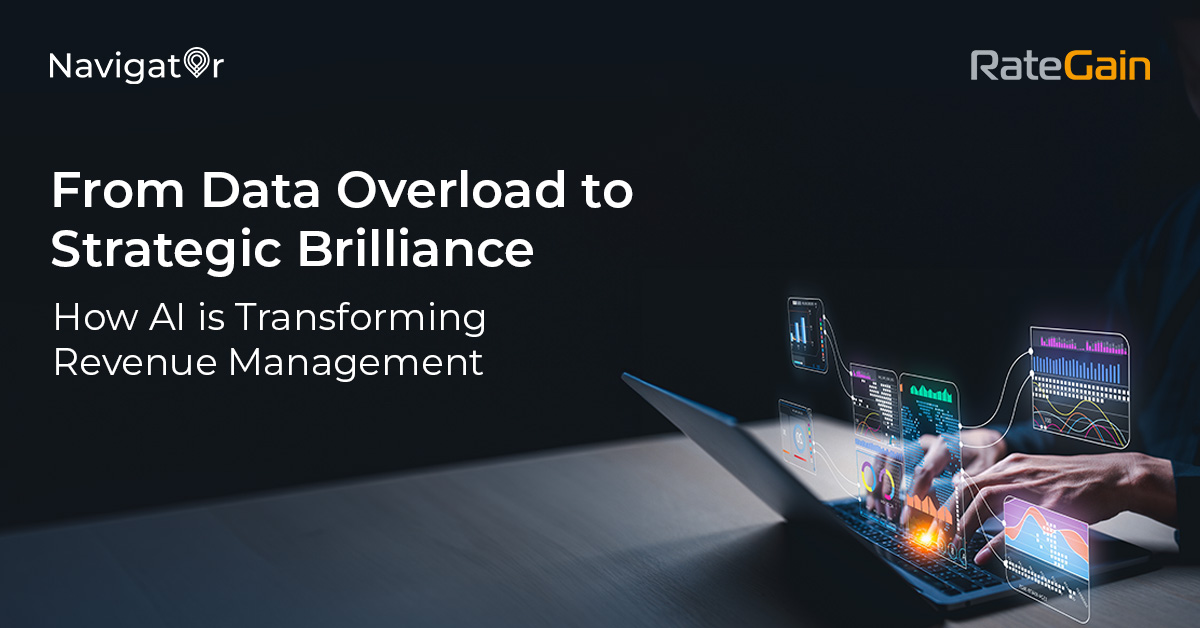The hospitality industry is at a pivotal moment. Rapid technological advancements, fluctuating demand patterns, and increasing competition have transformed the role of the Revenue Manager (RM) into one of the most dynamic positions within any hotel organization.
What was once a role rooted in operational tasks and tactical decisions has evolved into a strategic function that drives overall business performance. At the heart of this transformation is Artificial Intelligence (AI)—a game-changer that is redefining how revenue managers approach their daily challenges and long-term strategies.
The Market Shift: From Tactical to Strategic Revenue Management
Traditionally, revenue managers have been tasked with granular, day-to-day responsibilities: adjusting room rates, monitoring competitors, and managing occupancy levels. However, this reactive approach is no longer sufficient as the hospitality landscape grows increasingly complex.
A recent study by McKinsey revealed that companies leveraging AI in revenue management reported a 20-30% increase in profitability, with hotels achieving improved forecasting accuracy and better pricing strategies. Similarly, Gartner predicts that by 2026, 75% of large enterprises will use AI to automate decision-making processes in revenue management.
The shift is clear: revenue management is no longer just about “managing rates.” It’s about understanding and predicting guest behavior, navigating market dynamics, and driving long-term profitability.
How AI is Redefining the Revenue Manager’s Role
AI has become the backbone of modern revenue management, enabling RMs to move beyond operational firefighting and focus on strategic planning. Here are a few ways AI is transforming the industry:
- Enhanced Data Analysis:Revenue managers deal with vast amounts of data daily—from booking trends and market demand to competitor pricing. AI processes this data at lightning speed, uncovering patterns and insights that would take humans hours, if not days, to identify.
- Predictive Forecasting:Traditional forecasting relied on historical data and basic trend analysis. AI introduces dynamic models that consider external factors such as weather, local events, and even flight trends to predict future demand with unprecedented accuracy.
- Automated Rate Adjustments:AI-driven systems can monitor market fluctuations in real-time and adjust rates accordingly, ensuring that hotels remain competitive without manual intervention. This frees up revenue managers to focus on broader strategies.
- Personalized Guest Experiences:By analyzing guest preferences and booking behaviors, AI helps hotels craft personalized offers and pricing strategies, improving guest satisfaction and loyalty.
- Strategic Insights Over Tactical Work:With AI handling routine tasks, revenue managers are now positioned to take on more strategic roles, collaborating with marketing, operations, and sales to align pricing strategies with business goals.
The New Role of the Revenue Manager
As AI takes over routine operational tasks, the revenue manager’s role is evolving into that of a strategic advisor. They are no longer just rate-setters; they are data-driven strategists who guide their organizations through market complexities. This evolution is crucial as the industry faces increasing competition and guest expectations.
However, for revenue managers to thrive in this new landscape, they need tools that not only automate but also elevate their capabilities. This is where Rate Behavior Intelligence (RBI) comes into play.
What is Rate Behavior Intelligence?
Rate Behavior Intelligence is a feature in RateGain’s Rate Intelligence Platform Navigator, that enables users to analyze competitor pricing strategies and gain deeper insights into their own pricing approach through a comprehensive and intuitive visualization, making the information easily understandable and actionable.
How RBI Transforms Revenue Management
Rate Behavior Intelligence (RBI) is a next-generation AI-driven platform designed specifically for the modern revenue manager. It goes beyond automation, offering a suite of strategic insights and capabilities to drive competitive advantage. Here’s how:
- Pricing Leaderboard
The Pricing Leaderboard is a powerful tool that monitors the frequency of competitors’ price changes, identifying market leaders and followers.- How It Works: RBI tracks daily rate changes across competitors, visualizing their pricing behaviors over time using dynamic heatmaps and cumulative graphs.
- Strategic Benefits: Revenue managers can benchmark their pricing strategies against leaders, understand market positioning, and proactively adjust their rates to maintain a competitive edge.
The Pricing Leaderboard is a powerful tool that monitors the frequency of competitors’ price changes, identifying market leaders and followers.
- Rate Volatility and Seasonal Trends
RBI’s Rate Volatility analysis examines historical pricing data over 2-3 years, revealing patterns in rate fluctuations and seasonal trends.- How It Works: Visualizations like box plots display the spread of rates within a given time frame, highlighting minimum, maximum, and mid-range prices for each period.
- Strategic Benefits: Revenue managers can anticipate seasonal demand shifts, align pricing strategies with competitors, and identify optimal price points for future check-in dates.
For instance, during summer holidays or major events, RBI helps hotels dynamically adjust pricing to capitalize on peak demand without overpricing.
- Product Type and Inventory Insights
One of RBI’s standout features is its ability to track inventory levels and room-type availability among competitors.- How It Works: RBI analyzes when competitors’ room types (e.g., deluxe, suite) sell out and highlights trends in inventory decline.
- Strategic Benefits: Revenue managers can adjust pricing for their available room types to fill gaps in the market, maximizing revenue during high-demand periods.
If a competitor’s deluxe rooms sell out earlier than other categories, RBI alerts revenue managers to increase prices for similar rooms to capture more value.
- Rate Sensitivity and Demand Patterns
RBI combines price elasticity with demand analysis to identify the optimal price ranges for specific days of the week or seasons.- How It Works: Visual tools like candlestick charts and demand overlays highlight price bands and corresponding booking volumes.
- Strategic Benefits: Revenue managers can align their pricing with demand patterns, ensuring maximum occupancy and revenue optimization.
For instance, weekend pricing strategies can be fine-tuned to maintain higher rates without sacrificing demand, thanks to RBI’s demand sensitivity analysis.
Empowering Strategy with RBI
The key value of RBI lies in its ability to provide proactive, actionable insights. Unlike traditional tools that focus on historical data, RBI predicts future trends, helping revenue managers stay ahead of market shifts.
Examples of RBI’s Strategic Impact:
- Competitor Insights: By identifying market leaders, revenue managers can emulate successful pricing strategies or find opportunities to differentiate their offerings.
- Dynamic Adjustments: Seasonal and event-driven pricing adjustments ensure properties remain competitive without eroding profitability.
- Market Positioning: With tools like bell curves and heatmaps, RMs can visualize their position relative to competitors and make informed decisions to enhance market share.
The Road Ahead: AI as a Strategic Enabler
The hospitality industry’s future is firmly rooted in strategic, AI-powered revenue management. Tools like RBI are no longer optional—they’re essential for navigating the complexities of today’s market.
By leveraging AI and RBI, revenue managers can:
- Transition from operational firefighting to strategic leadership.
- Make data-driven decisions that align with long-term goals.
- Enhance guest satisfaction through dynamic, personalized pricing strategies.
The evolution of revenue management is no longer a distant future—it’s here, and it’s powered by AI. Embrace the transformation with Rate Behavior Intelligence and set your property on a path to smarter, more strategic decision-making.
-Mayank Rastogi, Senior Vice President & General Manager, RateGain Travel Technologies
Unlock the potential to outperform your competition, maximize your revenue, and redefine guest experiences.
 Deutsch
Deutsch Português
Português Italiano
Italiano Espanol
Espanol čeština
čeština ไทย
ไทย Français
Français


